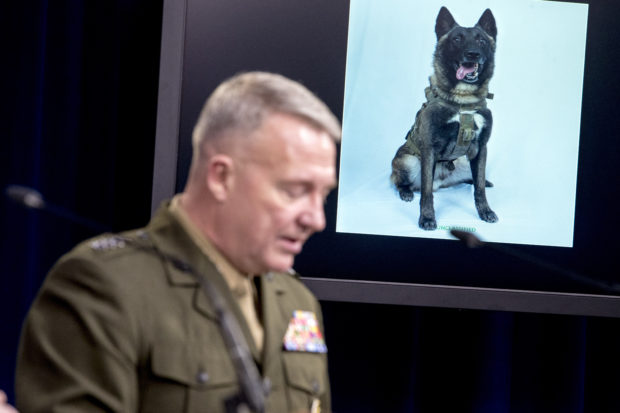Trump wants to honor dog from Syria mission at White House
WASHINGTON – Donald Trump is the first president since William McKinley not to have a dog live in the White House. But next week he wants to honor one by bringing Conan, a military working dog injured in the successful operation targeting Islamic State leader Abu Bakr al-Baghdadi, to Washington.

A working military dog is displayed on a monitor as U.S. Central Command Commander Marine Gen. Kenneth McKenzie speaks at a joint press briefing at the Pentagon in Washington, Wednesday, Oct. 30, 2019, on the Abu Bakr al-Baghdadi raid. (AP Photo/Andrew Harnik)
It remains unclear if the president will eventually meet some of the several dozen troops who took part in the risky operation in northwest Syria that ended with al-Baghdadi killing himself by detonating an explosives-laden vest as American forces closed in on him.
But he wants to meet the dog, tweeting Thursday that Conan “will be leaving the Middle East for the White House sometime next week!”
White House officials did not respond to a request for comment on whether any of the troops who took part in the al-Baghdadi raid — commandos in the Army’s elite Delta Force, members of the 75th Ranger Regiment and air crew from the Army’s 160th Special Operations Aviation Regiment — would be accompanying the Belgian Malinois.
No formal request for Conan to go to the White House has yet been sent and no visit is in the works, according to defense officials.
If Trump wants to see the dog or other members of the assault team, Pentagon leaders would recommend that the meeting involve just a small number of people and that no media be allowed, according to Defense Department officials who discussed internal deliberations only on the condition of anonymity. The preference would be for any meeting to happen in a secure location, not at the White House, they said.
Article continues after this advertisementThe dog, which suffered minor injuries when it was exposed to electric wires as he chased al-Baghdadi, is still deployed and working in the Middle East.
Article continues after this advertisementBringing the clandestine special operations forces to the White House would be a stark departure from the way similar events have been handled. U.S. senior leaders, including presidents and defense chiefs, have typically traveled to see the troops in secure locations to ensure their identities are not compromised.
Trump, while continuing to revel in last weekend’s operation in northwest Syria, confronts the balance between celebrating a major national security victory without overstating the significance of the killing in what will remain a highly volatile region for U.S. troops.
“There’s been a strong tendency for administrations to mistakenly suggest that a decapitation … is going to fundamentally degrade their groups’ ability to resurge or continue to operate,” said Seth Jones, a former adviser to the commander of U.S. Special Operations Forces in Afghanistan. “That has not been the case.”
The killing of Osama bin Laden, the capture of 9/11 mastermind Khalid Sheikh Mohammed, the drone strike that killed Yemeni-American terrorist Anwar al-Awlaki and the fatal attack on al-Qaida in Iraq leader Abu Musab al-Zarqawi were all moments of much publicized triumph for previous presidents.
Trump has latched onto the al-Baghdadi mission as he tries to bolster his standing with American voters while facing an impeachment inquiry. Trump also has faced criticism from Republicans as well as Democrats over his decision in October to cut U.S. troop presence in Syria.
In announcing al-Baghdadi’s death, Trump spoke in great detail about how U.S. troops carried out the mission. He’s credited himself for pressing commanders to focus on his capture.
On Wednesday, his campaign aired an updated version of a campaign ad during Game 7 of the World Series that touts Trump for “obliterating ISIS.” The ad also includes an image of al-Baghdadi and an official White House photograph of Trump and his national security advisers monitoring the mission in the Situation Room.
He also posted an altered photo of himself draping a medal on a dog resembling Conan. /gsg